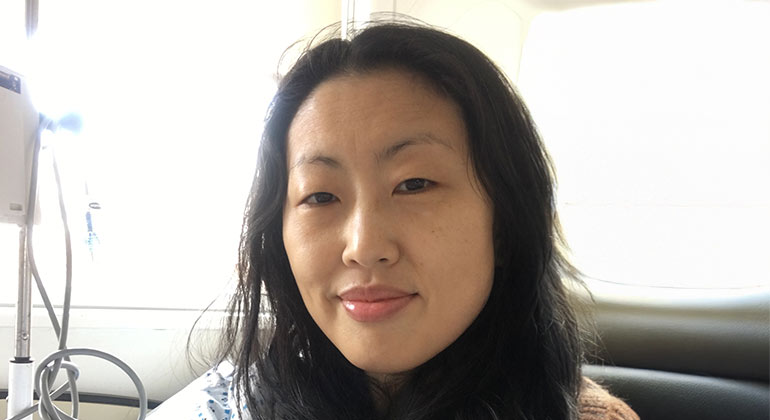
A Patient’s Journey Through Endometrial Cancer, With Help From Peers in ‘Woman to Woman'
Carol Lee was living an active, creative life in her mid-40s—working as a freelance graphic designer, running, practicing yoga, and pursuing her art. “I felt healthy. I was active and productive,” she recalls. Everything changed in 2019 when Carol began experiencing unusual symptoms.
“I used to have regular periods, and then all of a sudden my periods became very irregular and heavy,” she says. “Right before my diagnosis, I was spotting all the time.” After returning from graduate school abroad, she delayed seeing a doctor, until the symptoms became too concerning to ignore.
Initially, Carol’s gynecologist suspected fibroids. Thankfully, however, the doctor performed a biopsy, which led to a timely diagnosis of cancer.
Carol was referred to Stephanie V. Blank, MD, Director of Gynecologic Oncology for the Mount Sinai Health System, and Associate Director of The Tisch Cancer Institute. “I am so grateful. I can’t be happier that she was the one matched with me,” Carol says.
Initially it was not clear whether Carol had an endometrial cancer involving the cervix or a primary cervical cancer. “Both pathology and an MRI were inconclusive,” Dr. Blank explains. “We had a higher suspicion for endometrial cancer, but Carol had no risk factors for endometrial cancer and did have a history of abnormal pap and a cervical mass, so we needed to select a surgery that would be safe for both.”
Seeking medical help is critical
In March 2019, Carol underwent a hysterectomy with removal of tubes and ovaries, and sentinel lymph node mapping—a procedure that checks lymph nodes to assess the spread of cancer.
“Endometrial cancer is one of the only cancers with a rising incidence, and this is especially true in younger patients like Carol,” Dr. Blank says. “The hallmark sign of endometrial cancer, bleeding after menopause, does not apply to younger women. When younger women report irregular or heavy bleeding, both patients and doctors often attribute it to noncancer factors, such as fibroids or hormonal imbalance, so cancer can be missed. Seeking medical attention when bleeding does not seem normal, as Carol did, is critical.”
Undergoing a full hysterectomy was an emotionally heavy decision, as Carol and her boyfriend had been considering having a child. “Fertility options were presented to me by Dr. Blank,” Carol says, “But I knew very early on that I wanted to focus on living.”
Pathology revealed that the cervix was involved, which means that postoperative radiation was recommended. There were several options. “For me as a patient, it was agonizing to be given options to choose from. In some ways that was the hardest part in all the steps I had to work through.” Ultimately, Carol relied on Dr. Blank’s guidance. “What helped me with my final decision was the fact that Dr. Blank was comfortable with only internal radiation.”
She underwent about a half-dozen radiation sessions over a month and a half. “For me, I was lucky that it was a breeze,” she says. “I didn’t have any side effects—no nausea, no nothing.”
Emotionally, the experience was isolating. “I didn’t want to tell anybody,” she says. “I only shared the news with my boyfriend and my brother. I didn’t even tell my parents or any of my friends.”
That isolation began to lift when she discovered Woman to Woman, Mount Sinai’s peer support program for gynecologic cancer patients. “I got a lot of help,” she says. “Having a group of strangers who came to my aid to rally for me was meaningful.”
‘Empowering and uplifting’
Her involvement grew from participant to volunteer. She began with small graphic design assignments for the organization, and last year, through Dr. Blank, she was matched as a mentor to a newly diagnosed patient. She now serves as the editor of Woman to Woman’s newsletter and was the designer for the Wig Program that launched in May.
Carol says being part of Woman to Woman profoundly changed her. “Being part of that group saved friendships and relationships,” she says. “As well-meaning as your friends can be, they don’t understand that this is a lingering experience that you live with daily.”
She explains how being around other survivors gives her strength. “It’s incredibly empowering and uplifting. If you’re having a particularly terrible day, when you are extra anxious or scared, knowing there are other women who get it without needing an explanation is comforting. Recognizing that some women have faced, or are facing, even more difficult situations puts everything in perspective.”
In 2024, Carol took another step. Having worked in Tribeca in the early 2000s, she applied to the 9/11 Victim Compensation Fund and was awarded compensation related to her cancer. That experience led her and her partner to launch a nonprofit focused on raising awareness for other women who may qualify. “Endometrial cancer was only added to the list of covered conditions recently,” she says. “There are women who qualify and don’t know it.”
Through it all, her relationship with Dr. Blank remains a cornerstone of her care. “After my surgery, the next morning, Dr. Blank came to see me. I was still out of it, but I remember thinking, ‘I’m glad she’s my doctor.’ Your oncologist is kind of your doctor for life; it’s a long-term relationship.”
Carol hopes her story can help others. “Cancer doesn’t have to be something you always run from. It’s scary, but you can get through it, especially when you find the right care and the right community.”